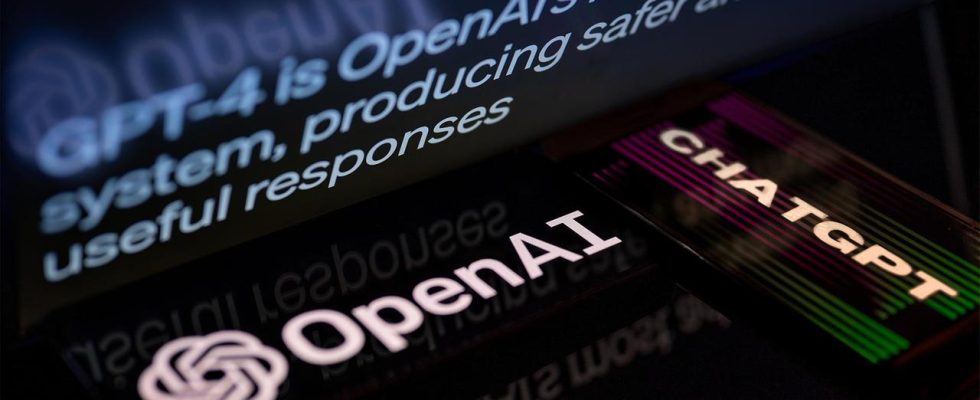While 2023 was still a year of – at least as perceived – an AI revolution, 2024 is likely to be a year of evolution. “The surprise effect from which ChatGPT benefited is over,” says Andreas Dengel, Managing Director of the German Research Center for Artificial Intelligence (DFKI) in Kaiserslautern. “The potential and breadth that AI has to offer have not yet been recognized,” he adds.
Many areas were just discovering the possibilities. These include, among others, finance and biotechnology, says Dengel. AI can be used to find anomalies in bank accounting records to detect money laundering, or in the medical field to test active ingredients.
Resource-saving AI at the center of research
In AI research itself, the aspect of how resources can be conserved is playing an increasingly important role. This is about how AI systems learn continuously instead of being retrained in a time-consuming manner. “The question is how the model’s predictions are continually updated with new data so that the AI system adapts to changes and improves its accuracy over time,” says DFKI Director Dengel.
This is also relevant for other branches of science, because artificial intelligence is also being increasingly used here – for example in climate research. “AI models can provide important insights into how the climate continues to change,” says Dengel.
2024 will also be an important year for the economy to advance technology. Providers of so-called generative AI such as ChatGPT not only aim to further improve their models, but also to integrate them into various applications.
Microsoft, for example, links its AI assistant “Copilot” with Word and Powerpoint, among other things. The AI can, for example, summarize texts or help create presentations. Other providers are also increasingly integrating artificial intelligence into their software. And OpenAI, the company behind ChatGPT, plans to soon offer different variants of the bot, depending on the purpose for which it is to be used.
Multimodality as an important trend
For the developers of generative AI, a lot of it revolves around one word: multimodality. This refers to AI models that can process texts, images and videos. “This will be an important development for everyday use this year,” says Kai Pascal Beerlink, AI expert at the digital industry association Bitkom.
Meta, but especially Google, are entering the market here and want to compete with the pioneers Microsoft and OpenAI. Google is relying on its latest AI model, Gemini, which is said to be able to analyze the content of images or generate videos from entered texts.
Digital worlds that are becoming increasingly easier to create. Scientist Dengel sees this as having ever greater consequences for the film and games industry. “This is of course very interesting, not least for the marketing and advertising industry,” adds Beerlink.
New providers are entering the market
Overall, the Bitkom industry expert expects the market to become more differentiated this year. “We will see that the quasi-monopoly position of Microsoft and OpenAI will dissolve,” says Beerlink. “New AI models will come onto the market that will then also occupy niches.”
Smaller, specialized providers want to benefit from this. However, another industry giant has also entered the AI race: Amazon. Last year, the company invested billions of dollars in the AI start-up Anthropic. So far, Amazon has taken on the role of a service provider for AI infrastructure. That could change this year with AI being incorporated into Amazon’s services. In particular, the expansion of voice control – keyword Alexa – is likely to play an important role.
But others also want to get involved here. Last year, the “AI Pin” from the provider Humane caused a certain stir in the USA. This is a type of smart brooch that can be used in a variety of ways using voice commands, for example to call someone or browse the Internet.
AI is also increasingly changing how devices are interacted with. Whether the smartphone will be abolished, as Humane aims to do, remains questionable. But: “Artificial intelligence will give these wearables a boost, and more of them will come onto the market because AI makes them more efficient and of better quality,” says Bitkom expert Beerlink.
Opportunities for European developers – and concerns about disinformation
With all the developments, is there still room for providers of AI language models from Europe? The Heidelberg start-up Aleph Alpha is considered a German hope. “Differentiation on the market is a great opportunity for European providers,” says Beerlink. “General language models from the USA will realistically not catch up with them. But they can occupy niches, for example in industrial manufacturing or in administration. In other words, where AI specializes and has to guarantee special security.”
Overall, safety concerns are likely to play an increasingly important role. Especially because 2024 is a politically significant year with more than 70 elections worldwide. Experts warn of disinformation campaigns fueled by AI-generated content. “I share these concerns,” says DFKI director Dengel. “Especially when you look at network analyzes in social media. There is a fear that AI-generated disinformation will be specifically addressed to multipliers – i.e. high-reach accounts – and that they will then spread the disinformation on a large scale.”
There are concerns here, especially with a view to the election of the US President. There is also another development in AI taking place in the USA that is likely to be groundbreaking this year. The New York Times newspaper recently filed a lawsuit against OpenAI, the provider of the ChatGPT bot. The Times believes its copyright has been violated in a large number of articles. In reports, screenshots can be seen that show how the chatbot copied excerpts from newspaper articles almost 1:1. According to observers, further lawsuits could follow that could put OpenAI in trouble.

